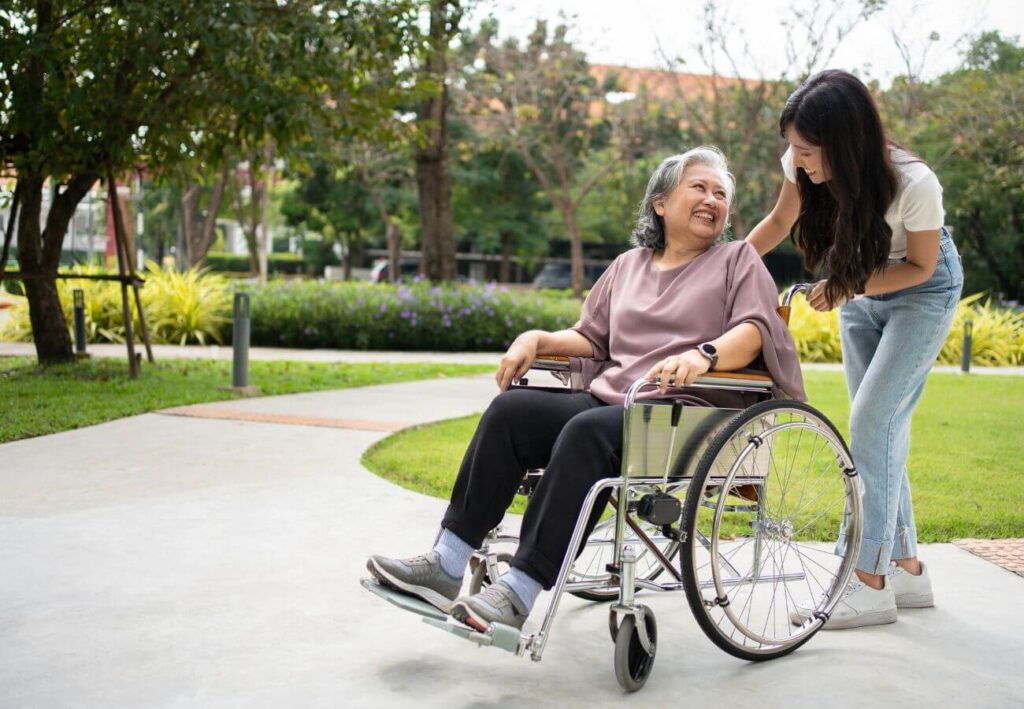The Role of Pet Therapy in Enhancing the Lives of the Elderly
Introduction
In senior care, it’s crucial to offer comprehensive support that takes care of people’s emotional needs. Pet therapy, also called animal-assisted therapy, is becoming really important for older folks living in care homes. It’s where they spend time with animals like dogs or cats to feel better. This article talks about how pet therapy is helping seniors in care homes. It explains how hanging out with pets can make them feel happier, healthier, and more connected with others. You’ll learn about the positive impact of pet therapy at First Choice Care Home in Fortuna. It’s making a big difference in the lives of elderly residents, creating a lively and satisfying atmosphere.
Understanding Pet Therapy
1. What is Pet Therapy?
- Definition: Pet therapy involves bringing trained animals into senior care facilities to interact with residents in structured sessions under the guidance of qualified therapists. The goal of pet therapy is to improve the physical, emotional, and social well-being of seniors through animal-assisted activities. Research has shown that interactions with animals can reduce stress, anxiety, and feelings of loneliness in older adults.
- Benefits: Pet therapy aims to improve residents’ physical health, mental well-being, and overall quality of life through positive interactions with animals. Studies have shown that pet therapy can reduce feelings of loneliness, anxiety, and depression in individuals. Additionally, interacting with animals has been linked to lower blood pressure and decreased levels of stress hormones.
2. Types of Therapy Animals
- Dogs: Dogs are the most common therapy animals due to their friendly and affectionate nature. They provide companionship, comfort, and emotional support to elderly residents. In addition to reducing feelings of loneliness and depression, therapy dogs can also help seniors stay active by encouraging them to go for walks or engage in light play. Their presence can create a sense of routine and purpose, improving overall mental well-being in senior care facilities.
- Cats: Cats are known for their calming presence and are often used in pet therapy programs to reduce stress, anxiety, and depression among seniors. Their gentle purring and affectionate nature can provide comfort and companionship to seniors who may be feeling lonely or isolated. Additionally, interacting with cats has been shown to lower blood pressure and improve overall emotional well-being in older adults.
- Other Animals: Some facilities may incorporate other animals such as birds, rabbits, or even miniature horses into their pet therapy programs, depending on residents’ preferences and needs. These animals can provide comfort, companionship, and emotional support to seniors who may be feeling isolated or lonely. The presence of therapy animals has been shown to reduce stress and anxiety levels in elderly individuals.
Benefits of Pet Therapy in Senior Care
1. Emotional Well-being:
- Reduced Feelings of Loneliness: Interacting with therapy animals can alleviate feelings of loneliness and isolation among elderly residents, providing companionship and unconditional love. Pet therapy decreases loneliness by promoting social interaction and providing a sense of purpose, ultimately improving overall mental well-being in seniors. Loneliness is a common issue among seniors, and pet therapy has been shown to improve mood and decrease symptoms of depression in this population.
- Mood Enhancement: Petting, cuddling, and playing with animals can trigger the release of endorphins, serotonin, and oxytocin, leading to improved mood and emotional well-being. Mood enhancement can also result in decreased feelings of loneliness and isolation among seniors, ultimately promoting a sense of connection and overall happiness in their daily lives. Additionally, the presence of animals can provide a source of comfort and companionship for seniors who may be experiencing cognitive decline or other health challenges.
2. Physical Health:
- Stress Reduction: Spending time with therapy animals has been shown to lower blood pressure, reduce stress hormones, and promote relaxation, which can have positive effects on heart health. Elderly residents are stressed and anxious due to various factors such as loneliness, health issues, and changes in their living situation. Pet therapy provides a source of comfort and companionship, helping to improve their overall emotional well-being and quality of life.
- Increased Physical Activity: Engaging in activities such as walking or playing with therapy animals encourages physical movement and exercise, contributing to improved mobility and flexibility. This can help seniors maintain their independence and reduce the risk of falls. Additionally, the social interaction and companionship provided by therapy animals can also improve overall well-being and mental health in seniors.
Pet Therapy at First Choice Care Home
1. Tailored Programs:
- Individualized Sessions: At First Choice Care Home, pet therapy programs are tailored to meet the unique needs and preferences of each resident, ensuring personalized and meaningful interactions with therapy animals. These individualized sessions provide residents with the opportunity to bond with animals in a way that is both enjoyable and beneficial for their overall well-being. The trained therapy animals at First Choice Care Home are selected based on the residents’ interests and comfort levels, creating a safe and positive environment for everyone involved.
- Structured Activities: Trained therapists lead structured pet therapy sessions that incorporate various activities, such as petting, grooming, and playing, to promote engagement and stimulation. These activities are designed to improve residents’ physical, emotional, and cognitive well-being by providing opportunities for social interaction and sensory stimulation. The presence of animals has been shown to reduce stress and anxiety, increase feelings of happiness, and improve overall quality of life for residents.
2. Positive Outcomes:
- Enhanced Socialization: Pet therapy encourages social interaction and communication among residents, fostering a sense of community and belonging within the care home. This can lead to improved mood and overall well-being for the residents, as they feel more connected and supported by both the therapy animals and their fellow residents. Additionally, the presence of therapy animals has been shown to reduce feelings of loneliness and isolation among residents, promoting a more positive and inclusive environment within the care home.
- Improved Emotional Well-being: Residents at First Choice Care Home experience increased happiness, reduced stress, and improved overall quality of life through regular participation in pet therapy sessions. The presence of therapy animals has been shown to decrease feelings of loneliness and isolation among residents, fostering a sense of companionship and connection. Additionally, pet therapy has been found to have a calming effect on individuals with dementia, helping to improve their mood and decrease agitation.
Conclusion: Embracing the Healing Power of Pets
In conclusion, pet therapy plays a vital role in enhancing the lives of elderly residents in care facilities by providing companionship, promoting emotional well-being, and improving physical health. The positive effects of pet therapy extend beyond simple interactions with animals, fostering a sense of purpose, joy, and connection among seniors. At First Choice Care Home in Fortuna, pet therapy is integrated into daily activities, enriching the lives of residents and creating a warm and nurturing environment. Experience the transformative power of pet therapy at First Choice Care Home and discover the joy of furry companionship for seniors. Contact First Choice Care Home today to learn more about their pet therapy programs and holistic approach to senior care.
You May Also Like
Choosing Senior Care Home: Questions Every Family Should Ask
Choosing a senior care home is a critical decision that affects not only the well-being of your…
Elder Care Homes and Sustainable Practices: A Growing Trend
In recent years, there has been a notable shift towards sustainability in various industries, including elder care…
Personalized Nutrition for Seniors: Dietary Plans Guide
Introduction As individuals age, their nutritional needs evolve, requiring tailored dietary plans to support their health and…



